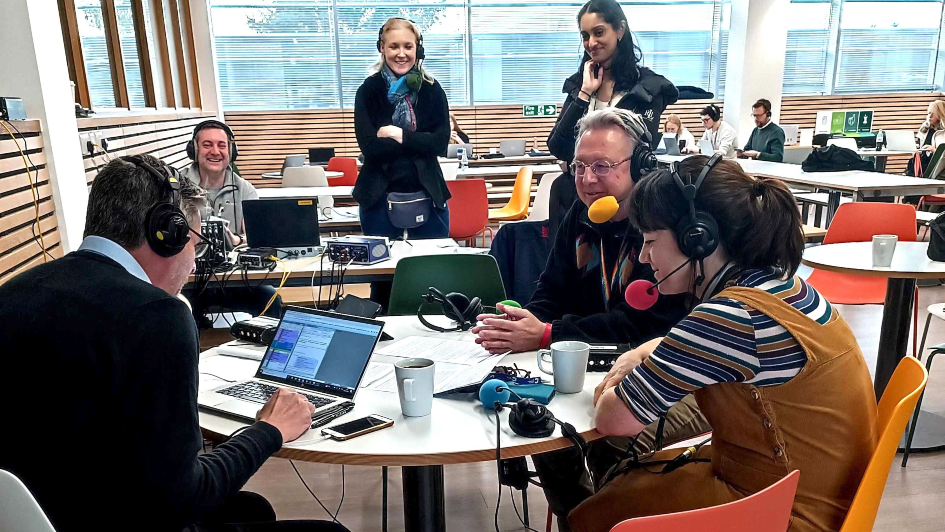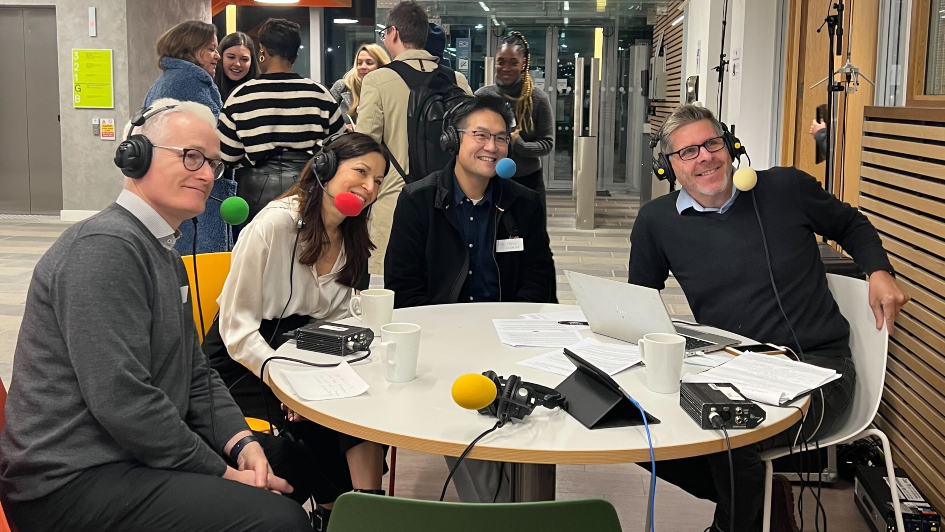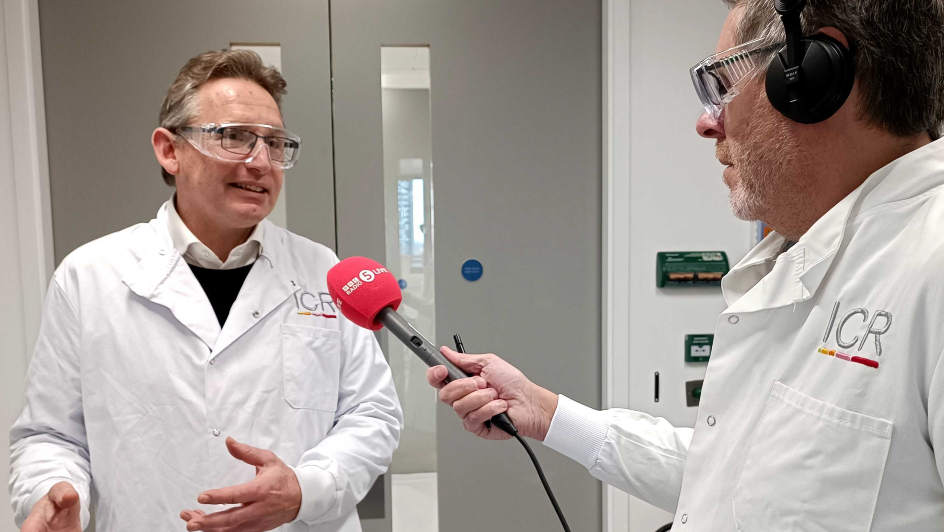
Image: Dr Nick Henriquez giving a lab tour to BBC Radio 5 Live Drive presenter Tony Livesey. Credit: Laura-Maria Horga.
Yesterday, we welcomed BBC Radio 5 Live Drive to the ICR as part of the station’s ‘day of hope’, which aimed to celebrate progress in cancer research and treatment. The day of hope was also raising awareness of a new special live recording of the award-winning podcast 'You, Me & the Big C’, and celebrating the legacy and impact of the podcast. The newest episodes of the podcast are set to be the last with Steve Bland and original co-host Lauren Mahon.
The podcast was started by three cancer patients in 2018 – Rachael Bland, Dame Deborah James, and Lauren Mahon – who discussed the practicalities of living with cancer in a light-hearted way. The ICR's Dr Paul Huang featured on the podcast in 2019 talking about his research into rare cancers. Also, last year the ICR gave honorary doctorates to Lauren and Steve, and, posthumously, to Dame Deborah, for their significant contribution in raising awareness of the impact of cancer.
How ICR’s pioneering research gives hope to patients
In the afternoon, BBC Radio 5 Live Drive presenter Tony Livesey and his production team set up to broadcast live from the café space in the Centre for Cancer Drug Discovery on our Sutton site, while his fellow presenter, Clare McDonnell, joined from the studio in Salford.
The show included a tour of the Centre for Cancer Drug Discovery and interviews with researchers from the ICR and The Royal Marsden NHS Foundation Trust, who discussed some of the latest drugs, treatments, and trials in cancer.
Please support the exciting research that is taking place in our Centre for Cancer Drug Discovery, so that we can continue to discover smarter, kinder treatments, to help more people live longer and better.
Tony started the special broadcast by showcasing some of the cancer research led by Professor Paul Workman, former Chief Executive of the ICR and Leader of both the Computational Biology and Chemogenomics team and the Signal Transduction and Molecular Pharmacology team, within the Centre for Cancer Drug Discovery (listen from 0:10:12).
Professor Workman discussed our work to discover new cancer drugs for personalised molecular medicine and how we take those through to the clinic with The Royal Marsden, which can then be taken forward in international trials for widespread use.
He highlighted our latest major drug discovery breakthrough – the drug called capivasertib – which has been shown to double the amount of time patients with advanced breast cancer stay tumour free in its first phase III trial. The drug was created and synthesised in a long-running research programme, initiated by ICR researchers and carried through into clinical development with our industry partners.
Professor Workman talked about some of our successful stories of discovering and developing life-extending drugs at the ICR. This includes olaparib which was found to be particularly effective in prolonging the life of women with early stage breast cancer that had defects in their BRCA gene. Another example is abiraterone – the first treatment shown to be effective in men with advanced prostate cancer – which we discovered and is now used around the world.
Collaboration between the ICR and The Royal Marsden
Alongside Professor Workman, Professor Clare Turnbull, Leader of the Translational Cancer Genetics team at the ICR and NHS Consultant in Clinical Cancer Genetics at The Royal Marsden, took the BBC 5 live listeners through some of the latest advances in cancer genetics.
Professor Turnbull emphasised the importance of analysing gene changes to identify those people who are at risk of developing cancer, and help with early detection and cancer prevention. Since gene testing is becoming cheaper to perform it is crucial to roll out pathways to deliver it to more people.
An example she mentioned is the Cancer Research UK-funded programme at The Royal Marsden which involves using a digital platform to offer part of the genetic BRCA testing pathway, making it much faster and accessible to many more patients in comparison to the traditional in-person approach.

Image: Professor Clare Turnbull and Professor Paul Workman discussing ICR’s pioneering research with BBC Radio 5 Live Drive presenter Tony Livesey. Credit: Laura-Maria Horga.
Also, Dr Susana Banerjee, Medical Oncologist and Research Lead for The Royal Marsden Gynaecological Unit and Leader of the ICR’s Gynaecological Cancers (Systemic Therapy and Clinical Trials) team, spoke about the ATARI trial which is testing a targeted therapy according to the patient’s molecular make-up in those with relapsed gynaecological cancers (listen from 0:20:08).
Sally, a patient who has been taking part in the trial after being referred to Dr Banerjee, talked about how fortunate she felt getting access to this treatment option and how she can enjoy good quality of life with family and friends two and half years into the trial.
Video: Dr Susana Banerjee, Dr Nuria Porta and Sally, a gynaecological cancer patient, talk about the ATARI trial.
The ATARI trial has its foundations in discoveries made at the ICR’s labs and the trial’s innovative design was developed by the ICR’s Cancer Research UK-funded Clinical Trials and Statistics Unit, which is managing the trial too. It’s one of many examples of the research made possible by our unique close partnership with The Royal Marsden.
Outsmarting cancer by predicting drug resistance in advance
Professor Trevor Graham, Director of the Centre for Evolution and Cancer at the ICR, and Dr Irene Chong, a Consultant Clinical Oncologist at The Royal Marsden NHS Foundation Trust and Clinician Scientist at the ICR, spoke about the promising new research being carried out by our scientists to overcome resistance to cancer treatments (listen from 0:45:08).
Minimising chemotherapy exposure to preserve drug sensitivity
Professor Graham and his team are interested in understanding evolutionary changes that drive cancer progression. By studying this process, they hope to be able to anticipate the changes that lead to resistance and identify new strategies to treat the cancer accordingly.
When patients undergo chemotherapy, most tumours initially respond, however repeated exposure to the drug often leads to cancer cells developing resistance. Professor Graham described how the traditional approach of using high doses of chemotherapy tend to kill all the sensitive cancer cells from the tumour, leaving behind resistant cells that no longer need to compete for resources with other cells. This then drives their expansion.
He explained how maintaining a small population of sensitive cancer cells by using lower doses of chemotherapy can allow these cells to out-compete and suppress the growth of treatment-resistant cells. This form of ‘adaptive therapy’ offers a long-term strategy to control the tumour, preserve drug sensitivity and improve patient outcomes.
Professor Graham talked about the UK’s first trial to test adaptive therapy, launching later this year. The ‘Adaptive ChemoTherapy for Ovarian cancer’ (ACTOv) clinical trial, where he will be a co-investigator, will be run in collaboration with colleagues at Barts Cancer Institute, Queen Mary University of London, and UCL Cancer Institute.
Enhancing patient selection to maximise treatment benefit
Dr Chong specialises in treating patients with oesophageal, stomach and colorectal cancers. Her research aims to discover new therapeutic targets and molecular ‘markers’ for these cancers.
Patients with oesophageal and stomach cancer have a very poor prognosis, limited treatment options, and urgently require new therapeutic strategies. Dr Chong spoke about recent research from her team that revealed a class of drugs called ‘ATR inhibitors’ as a potential therapeutic option for patients with stomach cancer harbouring specific genetic defects, giving these people new hope.
When asked about the future of cancer treatment, Dr Chong was optimistic. Although she warned that there was more to do, with new treatments such as immunotherapy also becoming available for subgroups of patients with gastrointestinal cancers, she expects to see more patients survive. In 20 years, she hopes that patient selection will be improved so that only those who will benefit from the treatment will receive it, thereby preventing unnecessary toxicity to patients.
Maggie’s at The Royal Marsden – giving people hope
As part of the show, Tony also interviewed guests from Maggie’s at The Royal Marsden (listen from 1:09:23), which is also based on the Sutton site. The charity offers free support to people with cancer and their families. Listeners heard Maggie’s Ambassadors – Eloise and Lizzie who met each other through the charity – talk about how Maggie’s helped them to feel represented and enabled them to connect with other people who were going through similar experiences after they were both diagnosed with triple negative breast cancer.
We also heard from Kate Fulton, a psychologist at Maggie’s, and another centre visitor Jo Saunders-Betts, who is currently on palbociclib (trials for which were led by the ICR in the UK) and hormone therapy for secondary breast cancer at The Royal Marsden. Jo emphasised the brilliant emotional support provided by the charity, adding that Maggie’s gave her hope and a future.
Rare cancers, tests to tailor treatment and cancer-killing viruses
Professor Paul Huang and Professor Kevin Harrington, joined by patient advocate Yvonne Diaz, also shared some of their latest work (listen from 1:45:50) – discussing topics like the challenge of researching and treating rare cancers, genetically modified cancer-killing viruses and the need for better tests to tailor cancer care.
The conversation began with Professor Huang discussing his experience on the You, Me and the Big C podcast with Dame Deborah James back in 2019. He reflected on Deborah’s strong belief in the power of research. As a firm believer in research, Paul recalled that she used to say she believed in research because it helped her ‘kick the can further down the road’. Professor Harrington joined the conversation, commenting on how You Me and The Big C really changed people’s attitude to cancer and encouraged them to speak openly about their experiences.
Better 'biomarkers' to tailor cancer treatment
Professor Harrington, joined by patient advocate Yvonne, also touched on the importance of ‘biomarker’ tests in cancer research and treatment. Biomarker tests measure specific changes, such as changes in genes or protein levels, that can make people more likely to benefit from treatment.
"Without such a test, what you end up doing is you give a treatment speculatively – you give some treatment, you hope it works,” explained Professor Harrington. “With a biomarker you can have a much greater level of confidence – not a guarantee, but a level of confidence. It’s important to recognise we don’t do enough in the biomarker space."
Yvonne was diagnosed with ALK+ lung cancer in 2021 and, as she explained, thanks to a biomarker test that showed she had an ALK mutation, she was matched to the right treatment – the one most likely to work for her specific cancer. She shared her personal story, explaining how she only needs to take a pill once a day. This has allowed her to live with a much better quality of life. At a time when she was quickly deteriorating, the targeted treatment made a massive difference: “Within two weeks of taking my pill, I was back at the dinner table."
The challenge of treating rare cancers
Professor Huang shared his experience working on rare cancers, with a particular focus on sarcomas and lung cancers. Part of his research seeks to understand why treatments stop working in these patients as they develop resistance.
He talked about how a key part of his work is also targeting the right drugs to the right patients. Despite the frustrations that go along with working on these hard-to-treat cancers, there is always hope: "We face a lot of failure in the lab, but it's the little successes that keep us going."
Wrapping up the conversation, Professor Harrington briefly discussed his work on how his team is weaponising viruses to treat cancer. In a recent early-stage trial, he tested the safety and dosage of a genetically modified cancer-killing virus known as RP2, and evaluated its ability to shrink tumours.

Image: Professor Kevin Harrington, Yvonne (patient advocate) and Professor Paul Huang with BBC Radio 5 Live Drive presenter Tony Livesey. Credit: Ichha Khanal.
Liquid biopsies, early detection and personalised therapies
Dr Naureen Starling, Consultant Medical Oncologist at The Royal Marsden, specialising in the treatment of gastrointestinal cancers, and Reader within the Division of Clinical Studies at the ICR, discussed her research work (listen from 2:42:26).
She explained how cancer blood tests, known as liquid biopsies, leverage the technological advances in genomics medicine, with great potential in transforming patient care from early detection and faster diagnosis to treatment management, with a particular focus on personalised therapy.
Dr Starling talked about the PREVAIL feasibility study which showed encouraging results when deploying liquid biopsies to support pancreatic and bile duct cancer patients getting diagnosed and receiving targeted treatment. Future work will focus on implementing this approach in the diagnostic pathway hoping to speed up diagnosis, reduce the need for repetitive uncomfortable investigations and improve patient outcomes.
‘Search and destroy’ drugs, quality of life and what is yet to come
The ICR and The Royal Marsden’s Professor Johann de Bono was positive about the future when he spoke with Tony Livesey (listen from 2:23:30). He started by discussing the progress that has been made in the field in recent years: “Our work from our group has added hundreds of thousands of life years to men and women suffering from cancer.”
But, as Professor De Bono pointed out, there is still work to do. His focus is developing medicines that selectively kill cancer cells while sparing normal cells.
Having led the VISION trial, Professor De Bono talked about the success of search and destroy medicines entering the clinic, like Lu-PSMA, which combines a potent radioactive medicine with a ‘homing signal’ that searches for tumour cells and binds to them, delivering radiation precisely to destroy the cancer.
Professor De Bono, who is Professor of Experimental Cancer Medicine at the ICR, reiterated that even though this is experimental work and researchers face many failures in the lab, there are also successes. He also talked about the importance of giving people extra years and time with their loved ones, but also giving them a good quality of life so that they can enjoy their time and live life to the fullest.
Wrapping up the conversation in the spirit of 5 Live’s ‘Day of Hope’ theme, Professor De Bono reflected on the advances made over the last few decades, as well as what is yet to come.
“I’ve seen huge advances in 20 years that I thought I’d never see in my lifetime – and I’m extremely confident we’re going to see many more advances in the next 20 years. But the work is ongoing, it’s a continuous effort,” said Professor de Bono. “My responsibility, my institution’s responsibility, is to keep working very hard to make a difference.”
You can listen to the full BBC 5 Live Drive episode hosted at the ICR by clicking the link below:
Listen to BBC 5 Live Drive episode
